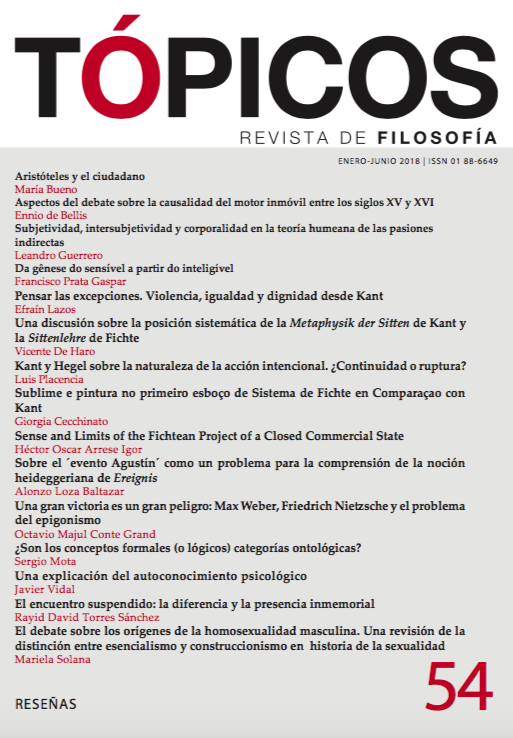Publicado 2017-11-11
Palabras clave
- Tractatus,
- Wittgenstein,
- concepto formal,
- categoría ontológica,
- lógica
Cómo citar
Resumen
En este trabajo trato de dar respuesta a la cuestión acerca de si los conceptos formales del Tractatus Logico-Philosophicus de Wittgenstein son o no categorías ontológicas. Mi respuesta es que no. Así, después de ofrecer una definición de ‘ontología’ (§2) y diferentes lecturas sobre las proposiciones iniciales del Tractatus (§3), presento la noción de concepto formal o lógico, así como diferentes interpretaciones en relación con el papel de esos conceptos en el Tractatus (§4). Después, y teniendo en consideración lo dicho en las secciones precedentes, presento (I) mi propia lectura de las proposiciones iniciales en términos de expresiones conceptuales o gramaticales, (II) la distinción tanto en extensión como en intensión de las nociones de concepto formal o lógico y categoría ontológica y (III) la disolución de la ontología, que no de la lógica (§5). Finalmente ofrezco unas conclusiones finales que recogen aspectos centrales de la discusión precedente (§6).
Referencias
- Acero, J.J. (2003). La autonomía de la gramática y la polaridad de la proposición. Revista de Filosofía, 44, 7-44.
- Alemán, A. (2011). Lógica, matemáticas y realidad, Madrid: Tecnos.
- Black, M. (1964). A Companion to Wittgenstein’s Tractatus. Cambridge: Cambridge University Press.
- Frascolla, P. (1997). The Tractatus System of Arithmetic. Synthese, 112, 353-378.
- Hacker, P. M. S. (1999). Naming, Thinking and Meaning in the Tractatus. Philosophical Investigations, 22, 119-135.
- _______ (1986). Insight and illusion. Themes in the philosophy of Wittgenstein. Oxford: Clarendon Press.
- Hierro S. Pescador, J. (1989). Principios de filosofía del lenguaje. Madrid: Alianza.
- Hutto, D. (2004). More Making Sense of Nonsense: from Logical Forms to Forms of Life. En B. Stocker (ed.) Post Analytic Tractatus. (127-149). Aldershot: Ashgate Publishing.
- Ishiguro, H. (1981). Wittgenstein and the Theory of Types. En I. Block (ed.) Perspectives on the philosophy of Wittgenstein. (43-59). Oxford: Basil Blackwell.
- _______ (1969). Use and Reference of Names. En P. Winch (ed.) Studies in the philosophy of Wittgenstein. (20-50). London: Routledge.
- McGinn, M. (2009). Wittgenstein and Internal Relations. European Journal of Philosophy, 18, 495-509.
- _______ (2006). Elucidating the Tractatus. Wittgenstein’s Early Philosophy of Logic and Language. Oxford: Clarendon Press.
- _______ (2001). Saying and Showing and the Continuity of Wittgenstein’s Thought. The Harvard Review of Philosophy, IX, 24-36.
- McGuinness, B. (2002). Approaches to Wittgenstein. Collected Papers. London: Routledge.
- Mota, S. (2015). Wittgenstein en torno a los conceptos. Análisis. Revista de Investigación Filosófica, 2, 195-219.
- Pears, D. (2006). Paradox and Platitude in Wittgenstein’s Philosophy. Oxford: Oxford University Press.
- _______ (1987). The False Prison: A Study of the Development of Wittgenstein’s Philosophy. Vol. I. Oxford: Clarendon Press.
- Potter, M. (2009). Wittgenstein’s Notes on Logic. Oxford: Oxford University Press.
- Quine, W.V.O. (1980). From a Logical Point of View. Cambridge, Mass.: Harvard University Press.
- Rhees, R. (2005). Wittgenstein’s On Certainty. There–like our life. Oxford: Blackwell Publishing.
- _______ (1969). ‘Ontology’ and Identity in the Tractatus: À Propos of Black’ Companion. En P. Winch (ed.) Studies in the Philosophy of Wittgenstein. (51-65). London: Routledge.
- Sanfélix, V. (2008). Sentir lo indecible. Sentido, sin sentido y carencia de sentido en el Tractatus de Wittgenstein. Revista de Filosofía, 33, 5-20.
- Tejedor, C. (2001). The Metaphysical Status of Tractarian Objects. Philosophical Investigations, 24, 287-303.
- Tomasini, A. (2011). Explicando el Tractatus. Una introducción a la primera filosofía de Wittgenstein. Buenos Aires: Grama.
- _______ (2005). Lenguaje y anti-metafísica. México, D.F.: Plaza y Valdés.
- _______ (2003). Estudios sobre las filosofías de Wittgenstein. México, D.F.: Plaza y Valdés.
- Wittgenstein, L. (2005). The Big Typescript: TS213. Oxford: WileyBlackwell. _______ (1979). Sobre la certeza. Barcelona: Gedisa.
- _______ (1958). Investigaciones filosóficas. Barcelona: Crítica.
- _______ (1922). Tractatus Logico-Philosophicus. London: Routledge.






